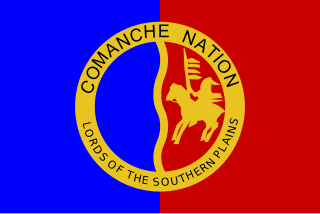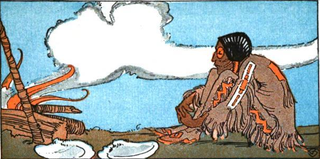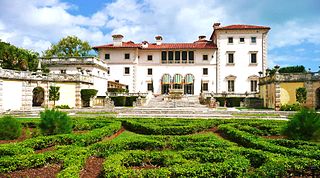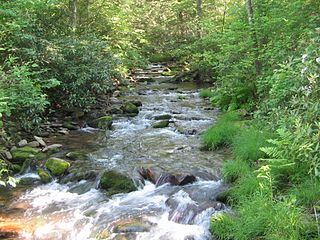Deer is a Native American given name. Notable people with the name include:
- Dick Deer Slayer, twentieth century Native American football player
- Susan Deer Cloud (born 1950), Native American writer
Deer is a Native American given name. Notable people with the name include:

The Comanche or Nʉmʉnʉʉ are a Native-American nation from the Great Plains whose historic territory consisted of most of present-day northwestern Texas and adjacent areas in eastern New Mexico, southeastern Colorado, southwestern Kansas, western Oklahoma, and northern Chihuahua. Within the United States, the government federally recognizes the Comanche people as the Comanche Nation, headquartered in Lawton, Oklahoma. The Comanche language is a Numic language of the Uto-Aztecan family. It was originally a Shoshoni dialect, but has diverged over time to become a separate language.
Oisín is an Irish male given name; meaning "fawn" or "little deer", derived from the Old Irish word os ("deer") + -ín. It is sometimes anglicized as Osheen or spelt without the diacritic (fada), as Oisin.

In Lakota mythology, Iktomi is a spider-trickster spirit, and a culture hero for the Lakota people. Alternate names for Iktomi include Ikto, Ictinike, Inktomi, Unktome, and Unktomi. These names are due to the differences in tribal languages, as this spider deity was known throughout many of North America's tribes.

The Yaqui, Hiaki, or Yoeme, are a Uto-Aztecan-speaking indigenous people of Mexico in the valley of the Río Yaqui in the Mexican state of Sonora and the Southwestern United States. They also have communities in Chihuahua and Durango. The Pascua Yaqui Tribe is based in Tucson, Arizona. Yaqui people live elsewhere in the United States, especially California, Arizona and Nevada.

The Vizcaya Museum and Gardens, previously known as Villa Vizcaya, is the former villa and estate of businessman James Deering, of the Deering McCormick-International Harvester fortune, on Biscayne Bay in the present day Coconut Grove neighborhood of Miami, Florida. The early 20th century Vizcaya estate also includes: extensive Italian Renaissance gardens; native woodland landscape; and a historic village outbuildings compound.

The Key deer is an endangered deer that lives only in the Florida Keys. It is a subspecies of the white-tailed deer. It is the smallest North American deer.
Sika may refer to:
Native Americans may refer to:
Hirschhorn is derived from German composite word "Hirsch" (deer) and "Horn" (horn), part of a deer's antlers. A variation is Hirshhorn. It may refer to:
Adina may refer to:

The Northern Cheyenne Indian Reservation is home of the federally recognized Northern Cheyenne tribe. Located in southeastern Montana, the reservation is approximately 690 square miles (1,800 km2) in size and home to approximately 5,000 Cheyenne people. The tribal and government headquarters are located in Lame Deer, also the home of the annual Northern Cheyenne pow wow.

White Deer Hole Creek is a 20.5-mile (33.0 km) tributary of the West Branch Susquehanna River in Clinton, Lycoming and Union counties in the U.S. state of Pennsylvania. A part of the Chesapeake Bay drainage basin, the White Deer Hole Creek watershed drains parts of ten townships. The creek flows east in a valley of the Ridge-and-valley Appalachians, through sandstone, limestone, and shale from the Ordovician, Silurian, and Devonian periods.
Deer are ruminant mammals forming the family Cervidae.

Deer Lake First Nation is an Oji-Cree First Nations band government in Northern Ontario, located north of Red Lake, Ontario Canada. It is one of the few First Nations in Ontario to have signed Treaty 5. It is part of the Keewaytinook Okimakanak Council and the Nishnawbe Aski Nation. As of December, 2007, the First Nation had 1,072 registered members, of which their on-reserve population was 868.

Yaqui music is the music of the Yaqui tribe and people of Arizona and Sonora. Their most famous music are the deer songs which accompany the deer dance. They are often noted for their mixture of American Indian and Catholic religious thought.
Native American self-determination refers to the social movements, legislation, and beliefs by which the Native American tribes in the United States exercise self-governance and decision making on issues that affect their own people.

The North American fur trade, an aspect of the international fur trade, was the acquisition, trade, exchange, and sale of animal furs in North America. Indigenous peoples and Native Americans of various regions of the present-day countries of Canada and the United States traded among themselves in the pre–Columbian era. Europeans participated in the trade from the time of their arrival to Turtle Island, commonly referenced as the New World, extending the trade's reach to Europe. The French started trading in the 16th century, the English established trading posts on Hudson Bay in present-day Canada during the 17th century, while the Dutch had traded by the same time in New Netherland. The North American fur trade reached its peak of economic importance in the 19th century and involved the development of elaborate trade networks.
Deer is an English surname. Notable people with the surname include:
Devyn is a unisex given name of English origin, meaning “bard, poet,” perhaps meaning “young deer.” Devyn is a version of Devin. Devyn is also a form of Devon (English).
Toney is a given name and a nickname. Notable people with this name include the following: